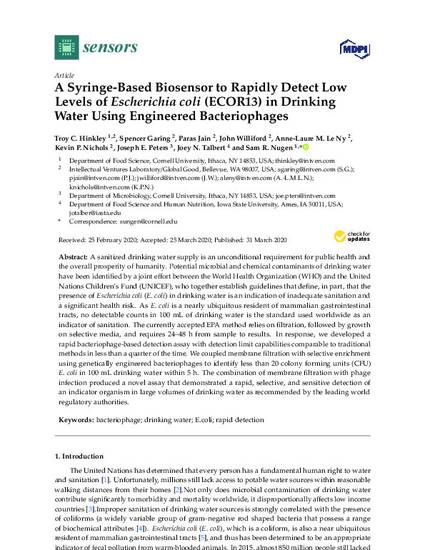
A sanitized drinking water supply is an unconditional requirement for public health and the overall prosperity of humanity. Potential microbial and chemical contaminants of drinking water have been identified by a joint effort between the World Health Organization (WHO) and the United Nations Children’s Fund (UNICEF), who together establish guidelines that define, in part, that the presence of Escherichia coli (E. coli) in drinking water is an indication of inadequate sanitation and a significant health risk. As E. coli is a nearly ubiquitous resident of mammalian gastrointestinal tracts, no detectable counts in 100 mL of drinking water is the standard used worldwide as an indicator of sanitation. The currently accepted EPA method relies on filtration, followed by growth on selective media, and requires 24–48 h from sample to results. In response, we developed a rapid bacteriophage-based detection assay with detection limit capabilities comparable to traditional methods in less than a quarter of the time. We coupled membrane filtration with selective enrichment using genetically engineered bacteriophages to identify less than 20 colony forming units (CFU) E. coli in 100 mL drinking water within 5 h. The combination of membrane filtration with phage infection produced a novel assay that demonstrated a rapid, selective, and sensitive detection of an indicator organism in large volumes of drinking water as recommended by the leading world regulatory authorities.
Available at: http://works.bepress.com/joey_talbert/7/

This article is published as Hinkley, T.C.; Garing, S.; Jain, P.; Williford, J.; Le Ny, A.-L.M.; Nichols, K.P.; Peters, J.E.; Talbert, J.N.; Nugen, S.R. A Syringe-Based Biosensor to Rapidly Detect Low Levels of Escherichia Coli (ECOR13) in Drinking Water Using Engineered Bacteriophages. Sensors 2020, 20, 1953. doi: 10.3390/s20071953.